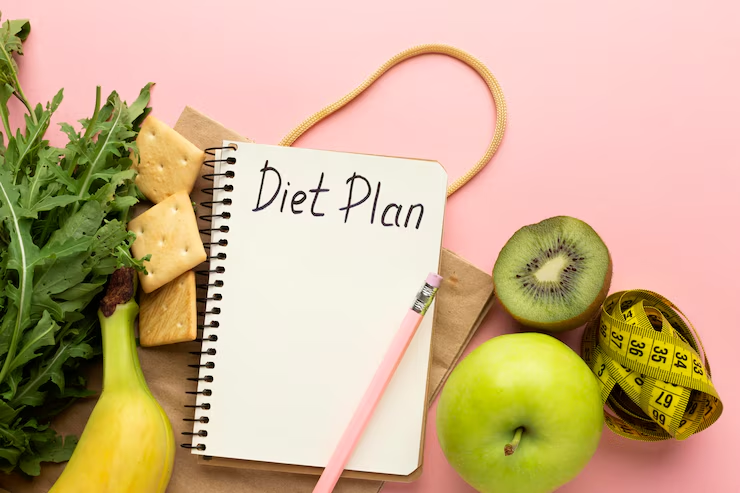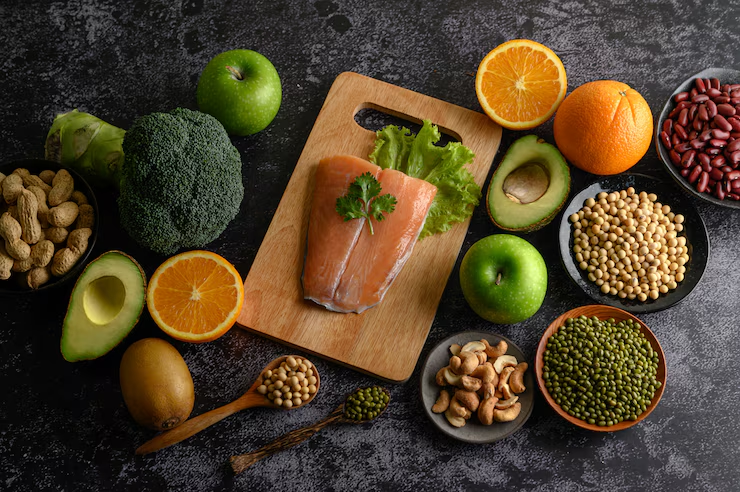Bulking diet plan is the foundation of effective muscle-building. While strength training triggers growth, proper nutrition supplies the energy and materials your body needs to recover and develop stronger muscles. Without enough calories and nutrients, even the best workout routine won’t deliver optimal results.
A successful bulking diet plan goes beyond just eating more food. It emphasizes nutrient-dense meals rich in lean proteins, complex carbohydrates, and healthy fats. Protein supports muscle repair and growth, carbs replenish glycogen and boost workout performance, and fats regulate hormones vital for muscle building. Timing is also important—eating regularly throughout the day ensures your body stays in an anabolic state.
To optimize your bulking results, prioritize whole foods over processed options, track your progress, and make gradual adjustments. A consistent bulking diet plan will help you gain lean muscle efficiently.
In this article, we’ll take you through a comprehensive guide on how to plan a successful bulking diet, including the top 8 tips to help you build muscle efficiently, avoid unwanted fat gain, and stay on track with your goals.

Understanding Bulking: What It Is and Why It Works
Before diving into the specifics of a bulking diet, let’s first understand the concept of bulking and why it’s important for muscle growth.
Bulking is a phase in a bodybuilder’s or athlete’s training cycle where the goal is to gain muscle mass. The primary focus during this period is to consume more calories than your body expends. This caloric surplus is necessary for muscle repair and growth, as well as for supporting the increased energy demands of weightlifting and high-intensity training.
While bulking, the body goes through a process of “muscle hypertrophy,” where muscle fibers are broken down and then rebuilt stronger and bigger. To support this process, your body needs the right nutrients, which is where a bulking diet comes in.
However, bulking doesn’t mean you should eat anything and everything in sight. Gaining muscle without excess fat requires smart choices, and it’s all about finding the right balance between muscle-building foods and controlled caloric intake.
How to Calculate Your Caloric Needs for Bulking
Calculating your caloric needs is the first and most critical step in designing a successful bulking diet plan. To begin, determine your Total Daily Energy Expenditure (TDEE), which is the number of calories your body burns in a day, including physical activity. This can be estimated using online TDEE calculators that consider your age, weight, height, gender, and activity level.
Once you know your TDEE, you’ll need to create a calorie surplus to support muscle growth. For a lean bulk, add 250–500 calories per day above your maintenance level. This surplus gives your body the extra energy it needs to build muscle without accumulating too much fat. It’s important to track your weight and adjust accordingly—if you’re not gaining, slightly increase your intake.
Your bulking diet plan should include high-quality calories from protein, complex carbs, and healthy fats. Prioritize whole foods and spread your meals throughout the day to ensure a steady supply of nutrients. With a properly calculated calorie goal and consistent eating, you’ll be on the right path toward gaining lean muscle mass.
Top Tips for an Effective Bulking Diet Plan
Calculate Your Caloric Needs and Surplus
The foundation of any effective bulking diet plan is understanding your maintenance calories—the amount of energy your body requires to keep weight steady. Accurately calculating this figure, whether via an online calculator or by tracking your intake and weight over a couple of weeks, ensures you know the baseline from which to work.
Once you’ve established maintenance needs, introduce a controlled caloric surplus to drive muscle growth. A typical guideline is adding 250–500 calories per day, tailored to your metabolism and activity level. Those with faster metabolisms or high training volumes may need closer to the upper end, while others may thrive on a more modest surplus.
Finally, monitor progress closely. Track body composition, strength gains, and energy levels to determine if your bulking diet plan is working. If you’re gaining too much fat, slightly reduce the surplus; if muscle gains stall, consider a gradual increase. Regular adjustments keep you on an optimal path toward lean muscle growth.
To calculate your caloric needs:
Start with your Basal Metabolic Rate (BMR) – this is the number of calories your body burns at rest.
Then, factor in your activity level (sedentary, moderately active, or very active).
Add a surplus of 250-500 calories depending on your goals (lean bulking vs. aggressive bulking).
Pro Tip: If you’re gaining weight too fast (more than 1-2 pounds per week), reduce your surplus to avoid excess fat gain. If you’re not gaining muscle or weight, increase your calories slightly.
Prioritize Protein for Muscle Growth
Protein plays a vital role in any bulking diet plan, as it’s essential for muscle repair and growth. When you work out, you create tiny tears in muscle fibers that require adequate protein to heal and grow back stronger. Without sufficient protein intake, even the most intense workouts won’t yield optimal results.

During a bulking phase, the general recommendation is to consume 1.0 to 1.5 grams of protein per pound of body weight daily. For a 180-pound individual, that equates to 180–270 grams of protein. Sources such as lean meats, eggs, dairy, and protein shakes make it easier to meet these targets consistently.
Timing also matters. Spreading your protein intake evenly across meals helps sustain muscle protein synthesis throughout the day. Incorporating protein into every meal and snack is a smart strategy for those following a structured bulking diet plan focused on maximizing muscle growth while supporting recovery.
The best protein sources include:
Lean meats (chicken, turkey, lean beef)
Fish (salmon, tuna, cod)
Eggs (whole eggs and egg whites)
Dairy (Greek yogurt, cottage cheese)
Plant-based proteins (lentils, quinoa, tofu)
Consuming protein in each meal, ideally spaced throughout the day, ensures a continuous supply of amino acids to the muscles, maximizing growth.
Fuel Your Workouts with Carbohydrates
Carbohydrates play a crucial role in any effective bulking diet plan because they serve as your body’s main energy source. When you’re training hard to gain muscle, your body relies heavily on glycogen—stored carbohydrates—to power through intense workouts and recovery.
Consuming enough carbs ensures your muscles remain full and your performance doesn’t decline. Whole food sources like rice, potatoes, oats, fruits, and whole grains provide not only fuel but also vital nutrients and fiber. These complex carbs release energy steadily, helping you sustain longer training sessions and build more lean mass.
Strategically timing your carb intake around workouts—especially pre- and post-workout—can optimize energy levels and enhance recovery. In a well-balanced bulking diet plan, carbohydrates work alongside protein to support strength gains, muscle repair, and workout endurance, making them an indispensable macronutrient in your muscle-building journey.
Great carb sources include:
Whole grains (brown rice, oats, quinoa)
Starchy vegetables (sweet potatoes, squash)
Fruits (bananas, apples, berries)
Legumes (beans, chickpeas, lentils)
Carbohydrates should be spread throughout the day, with a larger portion consumed around your workout (pre- and post-workout meals).
Don’t Neglect Healthy Fats
Carbohydrates play a crucial role in any effective bulking diet plan because they serve as your body’s main energy source. When you’re training hard to gain muscle, your body relies heavily on glycogen—stored carbohydrates—to power through intense workouts and recovery.

Consuming enough carbs ensures your muscles remain full and your performance doesn’t decline. Whole food sources like rice, potatoes, oats, fruits, and whole grains provide not only fuel but also vital nutrients and fiber. These complex carbs release energy steadily, helping you sustain longer training sessions and build more lean mass.
Strategically timing your carb intake around workouts—especially pre- and post-workout—can optimize energy levels and enhance recovery. In a well-balanced bulking diet plan, carbohydrates work alongside protein to support strength gains, muscle repair, and workout endurance, making them an indispensable macronutrient in your muscle-building journey.
Aim for 0.3-0.4 grams of fat per pound of body weight, which would be around 50-70 grams of fat daily for someone weighing 180 pounds. The best sources of healthy fats include:
Nuts and seeds (almonds, chia seeds, flaxseeds)
Avocados
Olive oil and coconut oil
Fatty fish (salmon, mackerel)
Incorporate these healthy fats into your meals to support overall health and muscle development.
Meal Timing Is Key
While total calorie intake is the foundation of a successful bulking diet plan, meal timing can enhance muscle-building results. Spacing meals evenly throughout the day ensures a constant supply of nutrients, which supports muscle repair and growth, especially after intense workouts.
Eating every 3–4 hours helps prevent muscle breakdown and keeps your body in an anabolic state. Including protein in each meal stimulates muscle protein synthesis consistently. This approach is especially beneficial when combined with post-workout nutrition, where fast-digesting carbs and proteins speed up recovery.
For those serious about maximizing gains, consuming a meal rich in protein and moderate in carbs shortly after training can make a noticeable difference. Whether you’re eating three large meals or six smaller ones, what matters most is that your bulking diet plan supports your training intensity and recovery needs, providing a steady stream of quality calories and nutrients throughout the day.
Key times to focus on:
Pre-workout: Have a meal rich in carbohydrates and moderate protein 1-2 hours before your workout for energy.
Post-workout: After exercising, consume a fast-digesting protein and carbohydrate-rich meal to replenish glycogen stores and kickstart recovery.
Throughout the day: Aim for 4-6 meals a day, spaced 3-4 hours apart, to continuously fuel your body.
Stay Hydrated for Optimal Performance
Hydration plays a crucial role in the success of any bulking diet plan. While most people focus solely on food, water is essential for transporting nutrients to your muscles, supporting digestion, and regulating body temperature during intense workouts. Even mild dehydration can reduce strength and endurance, affecting your ability to train effectively.

Muscle tissue is about 75% water, so staying hydrated helps maintain cell volume, which is key for muscle function and growth. Proper hydration also aids in the removal of waste products like lactic acid that accumulate during exercise, minimizing soreness and speeding up recovery.
To support your bulking diet plan, aim to drink at least 3–4 liters of water daily, adjusting for your body size and activity level. Include electrolyte-rich fluids or foods to replenish sodium, potassium, and magnesium lost through sweat. Staying hydrated ensures your body can fully utilize the calories and nutrients you’re consuming for maximum muscle gains.
Aim to drink at least 3-4 liters (100-135 ounces) of water per day, more if you’re engaging in intense workouts or living in a hot climate.
Pro Tip: If you’re consuming a lot of caffeine or have a high sodium intake, increase your water intake to compensate for potential dehydration.
Track Your Progress and Adjust as Needed
Tracking your progress is a critical part of any effective bulking diet plan. By keeping a detailed food journal or using a fitness app, you can monitor your calorie intake, macronutrient ratios, and body weight changes over time. This helps ensure that your diet is aligned with your muscle-building goals.
If you find that your strength and muscle mass aren’t increasing as expected, it may be a sign that your calorie intake is too low. Slightly increase your daily calories and monitor changes for a week or two. On the other hand, if you’re gaining excess fat along with muscle, you might need to reduce your calorie surplus.
The key to a successful bulking diet plan is flexibility and awareness. Adjusting your meals based on feedback from your body allows you to build lean muscle effectively while minimizing unwanted fat gain. Regular check-ins help keep your plan both efficient and sustainable over time.
Be Patient and Consistent
Success with a bulking diet plan doesn’t happen overnight. Building lean muscle mass is a slow and steady process that requires consistency in both nutrition and training. It’s important to resist the urge to rush the process by overeating, as this often leads to unwanted fat gain rather than quality muscle.
Patience is essential. Even if results aren’t visible immediately, your body is adapting behind the scenes—repairing tissue, increasing strength, and storing glycogen. Maintaining your commitment to a structured bulking diet plan ensures your progress is sustainable and effective over the long term.
Rapid weight gain is rarely all muscle. A controlled caloric surplus combined with proper strength training and recovery will deliver the best results. Trust the process, track your progress, and remember that a smart, balanced bulking diet plan supports long-term health and physique goals far better than any quick fix. Stay consistent and the gains will come.
Sample Bulking Diet Plan
Here’s your bulking diet plan in a structured table format for a 3,000-calorie intake:
| Meal | Foods | Details |
|---|---|---|
| Breakfast | – 4 scrambled eggs with spinach- 1 cup oatmeal with berries- 1 tbsp peanut butter- 1 glass orange juice | High in protein, healthy fats, and carbs |
| Snack | – 1 cup Greek yogurt- Honey- Almonds | Great for protein and energy between meals |
| Lunch | – 6 oz grilled chicken breast- 1.5 cups brown rice- Steamed broccoli- 1/2 avocado | Balanced macronutrients |
| Pre-Workout Meal | – 2 slices whole grain toast- 1 banana- 1 scoop whey protein shake | Quick-digesting fuel for workout |
| Post-Workout Meal | – 6 oz grilled salmon- 1 cup quinoa- 1 medium sweet potato | Replenishes glycogen and supports recovery |
| Dinner | – 6 oz lean beef- Roasted carrots, zucchini, bell peppers- Mixed greens with olive oil | Nutrient-rich and satiating |
| Before Bed Snack | – 1/2 cup cottage cheese- A handful of walnuts | Slow-digesting protein to support overnight growth |
This bulking diet plan ensures a steady supply of calories and nutrients to support muscle growth and recovery throughout the day.
Meal Timing: When to Eat for Maximum Growth
The timing of your meals can significantly affect your muscle-building potential. Meal frequency and nutrient timing ensure that your body receives a steady supply of energy and protein throughout the day to optimize muscle growth and recovery.
Pre-Workout: Eat a balanced meal 1-2 hours before training. This meal should include both carbohydrates for energy and protein to fuel your muscles.
Post-Workout: After exercise, the body is primed for nutrient uptake. Consuming a fast-digesting protein (like whey) and carbohydrates within 30 minutes of finishing your workout can help replenish glycogen stores and accelerate muscle recovery.
Throughout the Day: Aim for 4-6 smaller meals spread across the day to maintain steady energy levels and support muscle protein synthesis continuously.
Conclusion
A successful bulking diet plan revolves around maintaining a consistent caloric surplus with the right macronutrient balance to support lean muscle growth. The key is to consume more calories than your body burns, but from nutrient-rich sources that fuel performance and recovery. Strategic planning helps avoid unnecessary fat gain while maximizing strength and size.

To make your bulking diet plan effective, focus on these essentials: calculate your daily calorie needs, prioritize high-quality protein, incorporate enough carbohydrates for energy, and include healthy fats for hormone support. Meal timing, hydration, and consistent tracking are just as important to ensure you’re meeting your goals without setbacks.
Lastly, remember that bulking takes time and consistency. Rapid gains often lead to fat accumulation, so be patient and adjust your bulking diet plan based on progress. Stay committed, track your nutrition and training, and your efforts will translate into long-term muscle gains.
FAQs
Q1. What is a bulking diet plan and why is it important ?
A bulking diet plan is a structured eating approach designed to support muscle growth by providing a caloric surplus—more calories than your body burns. It emphasizes high-protein intake, balanced macronutrients, and nutrient-dense meals to fuel workouts and recovery. Without a proper bulking plan, your body may lack the energy and building blocks needed to increase lean muscle mass efficiently.
Q2. Can I gain muscle without gaining fat on a bulking diet plan ?
Yes, by following a clean bulking diet plan, you can gain muscle with minimal fat. The key is to create a moderate caloric surplus, eat nutrient-dense foods, stay active, and monitor your progress. Avoid dirty bulking (eating junk to gain weight fast), as it leads to excess fat gain and can negatively impact your health and physique.
Q3. How many calories should I eat on a bulking diet plan ?
The number of calories depends on your Total Daily Energy Expenditure (TDEE). Typically, you should eat 250–500 calories above your maintenance level. For example, if your TDEE is 2,500 calories, your bulking diet plan might include 2,750–3,000 calories daily. Monitoring weight and adjusting based on progress ensures optimal results with minimal fat gain.
Q4. What foods should I include in a bulking diet plan ?
A solid bulking diet plan includes lean proteins (chicken, fish, eggs), complex carbohydrates (brown rice, oats, sweet potatoes), healthy fats (avocados, nuts, olive oil), and vegetables. These foods provide essential nutrients, support muscle repair, and promote overall health while helping you meet your caloric goals.
Q5. How much protein should I consume during bulking ?
Protein is vital for muscle repair and growth. In a bulking diet plan, aim for 1.0–1.5 grams of protein per pound of body weight daily. For instance, a 180-pound person should consume between 180–270 grams of protein. Spread this intake across all meals to maintain steady muscle protein synthesis throughout the day.


